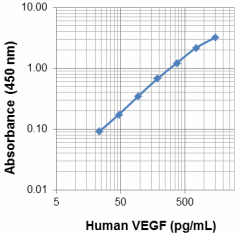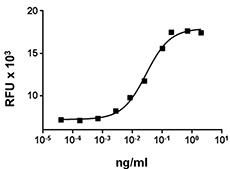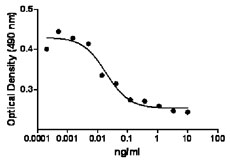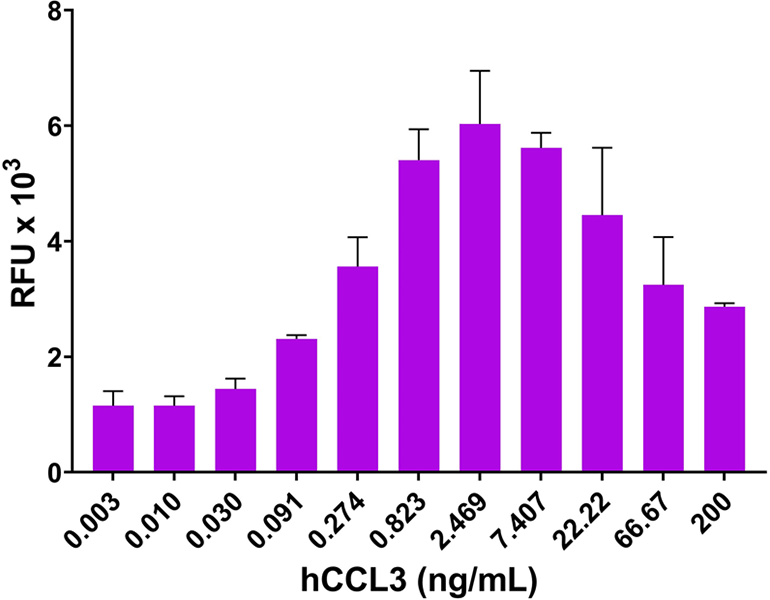- Regulatory Status
- RUO
- Other Names
- VEGFA, VEGF-A, VPF, MVCD1, vascular endothelial growth factor
- Ave. Rating
- Submit a Review
- Product Citations
- publications

VEGF (also known as VEGF-A) is a signaling protein with strong vascular permeability activity that stimulates the formation of new blood vessels during the processes of vasculogenesis and angiogenesis. It is a member of the vascular endothelial growth factor family, which in mammals is comprised of VEGF-A, VEGF-B, VEGF-C, VEGF-D, and PlGF (placental growth factor). There are multiple isoforms of VEGF that result from alternative splicing of mRNA. VEGF binds and activates two tyrosine kinase receptors, VEGFR1 (Flt-1) and VEGFR2 (KDR/Flk-1), through which VEGF exerts its mitogenic effects. VEGF is highly expressed in solid tumors of breast, lung, renal, colorectal, and hepatic origin. Additionally, it significantly contributes to ascites tumor formation. Beyond cancer, VEGF has also been associated with multiple pathogenic conditions including rheumatoid arthritis, age-related macular degeneration, Crow-Fukase syndrome, sclerosis and Alzheimer’s disease.
Product DetailsProduct Details
- Source
- Human VEGF-165, amino acids Ala27-Arg191 (Accession# AAM03108) was expressed in 293E cells.
- Molecular Mass
- The 165 amino acid recombinant protein has a predicted molecular mass of approximately 19 kD. The DTT-reduced protein migrates at approximately 20-28 kD and non-reduced protein migrates at 50 kD by SDS-PAGE. The N-terminal amino acid is Alanine.
- Purity
- >95%, as determined by Coomassie stained SDS-PAGE.
- Formulation
- Lyophilized in sterile-filtered PBS, pH 7.2, containing 1% BSA, 0.09% sodium azide, and protease inhibitors.
- Concentration
- Lot-specific (to obtain lot-specific concentration and expiration, please enter the lot number in our Certificate of Analysis online tool.)
- Storage & Handling
- Unopened vials can be stored between 2°C and 8°C until the expiration date. Prior to use, reconstitute the lyophilized powder with 0.2 mL of PBS containing a carrier protein (e.g., 1% BSA, protease free), pH7.4. Re-cap vial, vortex. Allow the reconstituted standard to sit at room temperature for 15 minutes, vortex again to mix completely. The reconstituted standard stock solution can be aliquoted into polypropylene vials and stored at -70°C for up to one month. Do not re-use diluted standards. Avoid repeated freeze/thaw cycles.
- Application
-
ELISA - Quality tested
- Recommended Usage
-
Each lot of this protein is quality control tested by ELISA assay. For use as an ELISA standard, a standard curve comprised of doubling dilutions from 23.4 to 1,500 pg/mL is suggested. It is recommended that the reagent be titrated for optimal performance for each application.
- Application Notes
-
This human VEGF protein is useful as a standard for a human VEGF sandwich ELISA, using unlabeled A15136H antibody (catalog #537002) as capture and biotinylated Poly5225 antibody (catalog #522503) as detection.
Antigen Details
- Structure
- Homodimer
- Distribution
-
Widely expressed
- Function
- VEGFA is a key player in vasculogenesis, the formation of blood vessels from progenitor cells, as well as angiogenesis. The expression of the VEGFA gene is upregulated via hypoxia, estrogen, and NF-κB pathways. In addition, VEGFA is upregulated by PDGF-BB, P1GF, TGFβ1, IGF1, FGFs, HGF, TNFα, and IL-1. VEGFA induces proliferation and cell migration in endothelial cells, and plays important roles during wound healing. Also, VEGFA regulates haematopoietic stem cell survival.
- Interaction
- VEGFA interacts with vascular endothelial cells and monocytes/macrophages, which express VEGFR1. This interaction induces proliferation of endothelial cells and stimulates migration of monocytes/macrophages.
- Ligand/Receptor
- VEGFA binds and activates two tyrosine kinase receptors, VEGFR1 (Flt-1), VEGFR2 (KDR/Flk-1)
- Biology Area
- Angiogenesis, Cell Biology, Neuroscience, Stem Cells, Synaptic Biology
- Molecular Family
- Cytokines/Chemokines, Growth Factors
- Antigen References
-
- Conn G, et al. 1990 Proc. Natl. Acad. Sci. USA 87:1323.
- Gerber H, et al. 2002. Nature 417:954.
- Shibuya M. 2006. J. Biochem. Mol. Biol. 39:469.
- Shibuya M. 2008. BMB Rep. 41:278.
- Monaghan-Benson E, et al. 2010. The American Journal of Pathology 177:2091.
- Koch S and Claesson-Welsh L. 2012. Cold Spring Harb Perspect Med. 2:a006502.
- Gene ID
- 7422 View all products for this Gene ID
- UniProt
- View information about VEGF on UniProt.org





















Follow Us